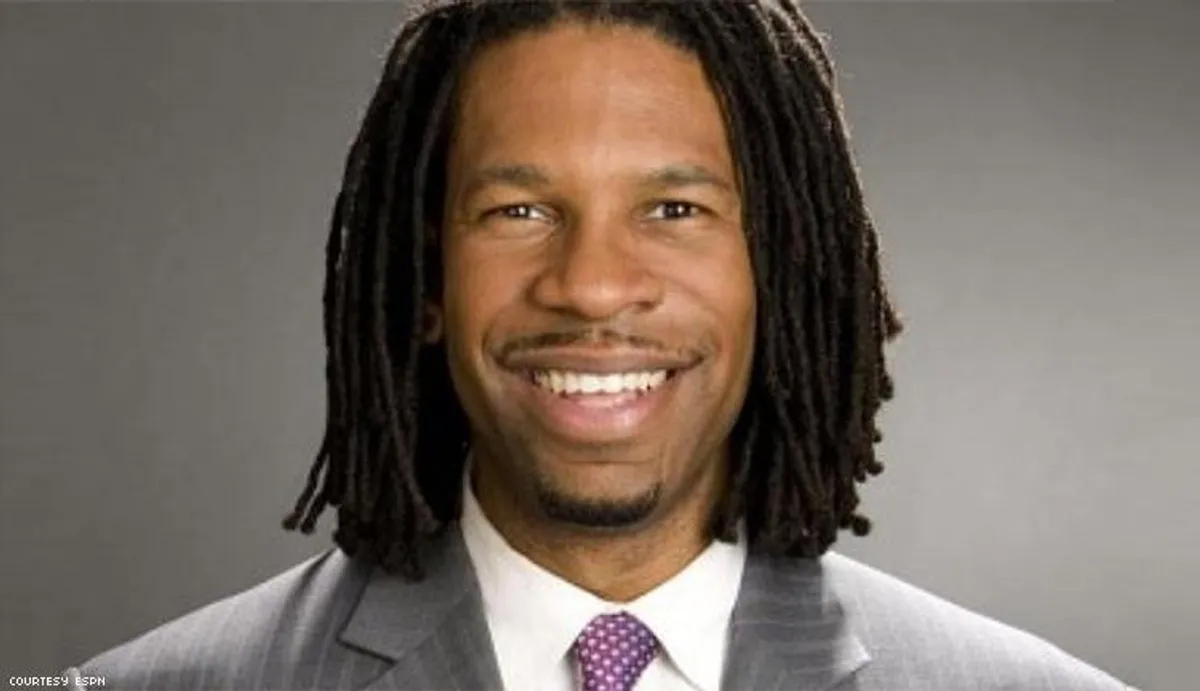Exclusives
This Black Gay Sports Journalist Is a Renaissance Man

Actor, writer, and radio host LZ Granderson represents a new generation of enlightened sports journalists.

Donald Padgett
August 25 2019 5:10 AM EST
August 25 2019 11:20 PM EST
By continuing to use our site, you agree to our Private Policy and Terms of Use.

Actor, writer, and radio host LZ Granderson represents a new generation of enlightened sports journalists.
LZ Granderson is a new type of sports personality: accomplished, multitalented, woke, and unafraid to make his voice heard. A cohost of Mornings With Keyshawn, LZ, and Travis on ESPN Radio Los Angeles, the 47-year-old Detroit native has written for CNN, ESPN, ABC, The Atlanta Journal-Constitution, and the Los Angeles Times. He's also a gay man blazing a trail through the traditionally heterosexist industry of sports news.
Granderson wrote for his school newspapers throughout high school and college, but it was his love for the stage that sent him to Western Michigan University.
"I had a theater scholarship," he says. "I was acting in high school. I had an amazing teacher by the name of Marilyn McCormick. ... One of my [college] professors was a professional working actor. He made a famous commercial at the time for Apple computers and was on A Different World."
These special connections led Granderson to his first film role, in Zebrahead. Then he had the opportunity to appear in the 1996 film To Sir, With Love II with Sidney Poitier, but there was just one problem: He was in the final semester of college and past the drop date for his classes. But the choice was inevitable. He bit the bullet and took a hit to his GPA. There was no way he could turn down this opportunity.
"I was in a fucking movie with Sidney Poitier!" he exclaims. "I was in scenes with Sidney Poitier. And I got to talk and interact with Sidney Poitier. And he called my mom up to thank her for the support of his career over the years, so it was an absolutely amazing experience."
Granderson's move from actor to sportswriter was, he recalls, "a very natural transition for me. Even through college I was working for the student paper, and I had internships and worked for the local newspaper. So even as I was pursuing an acting career, I was also working on my craft as a journalist, as a writer."
At first, Granderson says sports newsrooms were reluctant to accept an out gay man into what was viewed as a fiercely heterosexual domain.
"It's interesting because in some ways the industry of journalism was covering homophobia in sports while not addressing the homophobia that was in the newsroom," he says now. "And to be an openly gay person, you see this sort of hypocrisy that was both frustrating as well as enlightening because it became apparent to me that part of the barrier to openly gay athletes wasn't simply the people answering the questions but also the people asking the questions."
Granderson described an industry that seemed intent on perpetuating the myth that a gay man could not be trusted in a men's locker room. Those covering sports often asked questions designed to put athletes in a no-win situation when it came to sexuality. Over time, however, attitudes slowly changed. And as news coverage changed, so did sports. Yet, there are no out gay athletes in any of the major American team sports.
"Obviously, we're not there yet," he admits. "There's no openly gay player in any of the major sports for a variety of reasons, the homophobia being one of them. But I do believe that since when I first started working as an openly gay journalist in the '90s, the attitudes of the country and sports in general have changed for the positive in a dramatic fashion."
Granderson's latest gig is in the newly created role of sports and culture columnist for the Los Angeles Times. It's the perfect perch to observe and write about the intersectionality of sports and society.
"My job is to look at the tentacles of sports and sports culture. Looking at all the ways both X's and O's as well as financial, political, and culturally the way that sports, particularly Los Angeles sports, affect the community and the country as a whole."
The sports world is experiencing a renaissance of relevance as athletes like Colin Kaepernick have demonstrated they can be influential far from the field in arenas like politics and social activism. As a reporter, Granderson is at the forefront of that change, documenting how sports intersects with culture, politics, and the broader world.